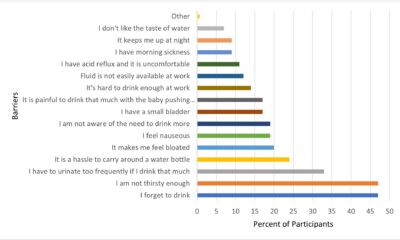Health
Handing tablets to toddlers could lead to anger problems later, researchers warn

Topline
Providing toddlers with a tablet could lead to anger problems later on, according to new research published on Monday. This adds to mounting evidence that ubiquitous mobile devices are hindering children’s development, amid increasing efforts to regulate the content they see online.
Research shows that children who used tablets at a young age had more outbursts of anger later on.
Key facts
Tablet use at age 3.5 “was significantly associated” with a tendency toward anger and frustration a year later, according to peer-reviewed research published in JAMA Pediatrics.
To investigate whether tablet use affected angry outbursts in young children, a group of researchers from universities in Canada, South Africa and Brazil evaluated parental reports and behavioral surveys to assess expressions of anger and frustration in the same group of children aged 3.5 years, 4 .5 years old. years and 5.5 years.
Tablet use at age 4.5 was also linked to increased outbursts of anger and frustration at age 5.5, said the researchers, who followed 315 parents of preschoolers from Nova Scotia, Canada.
Children who were angrier and more frustrated at age 4.5 were also more likely to use tablets at age 5.5, the data showed. A finding that, according to the researchers, indicates that tablets are involved in a negative ‘cycle’ of poor emotional regulation.
They said the research shows that tablet use not only undermines the ability to “manage emotions effectively during daily routines” but also causes children to “elicit more digital strategies to dampen outbursts.”
What we don’t know
The researchers said it is not clear why the use of tablets or other mobile devices appears to disrupt children’s emotional development. There is evidence that children learn emotional regulation through two main pathways, the researchers said: by observing parents’ emotional regulation strategies or through “emotional coaching” on how to deal with parents’ emotions. The researchers said tablet use can disrupt both mechanisms and both reduce learning opportunities and undermine the development of the strategies used to regulate emotions.
What to pay attention to
The researchers said their study only looked at whether tablets were used by children and that it would be important for future research to investigate the nature of these interactions. The researchers said it is important to know how the tablet was used – active use such as reading would be different from passive use such as watching a video, for example – and the level of parental interaction while using the tablet, such as sharing using the tablet or leaving a child alone.
Surprising fact
The researchers said there are some evidence tablets that, when used appropriately with parents, can be used to help children practice recognizing and responding to emotions, improving behavior rather than leading to more outbursts to lead.
Important background
The findings add to growing research suggesting that mobile devices such as phones and tablets have a negative impact on children and their development. For example, research shows that giving a phone or tablet to a child having a tantrum can help injury their ability to control their emotions and that screen time harms development of essential language and social skills. The problems don’t stop at kindergarten, and many high schools across the country do racing to ban smartphones as more and more teachers warn they have become a distraction in the classroom. The type of content children view online is also a growing problem and lawmakers are increasingly trying to regulate how young users interact with material online, especially social media, to improve their mental health.
Big number
80%. That’s the number of American households with children that owned a tablet computer, according to research facts from the Census Bureau.
Receive text alerts from Forbes Breaking News: We’re launching text alerts so you’re always up to date on the top stories driving the day’s headlines. Text “Alerts” to (201) 335-0739 or Log In here.











